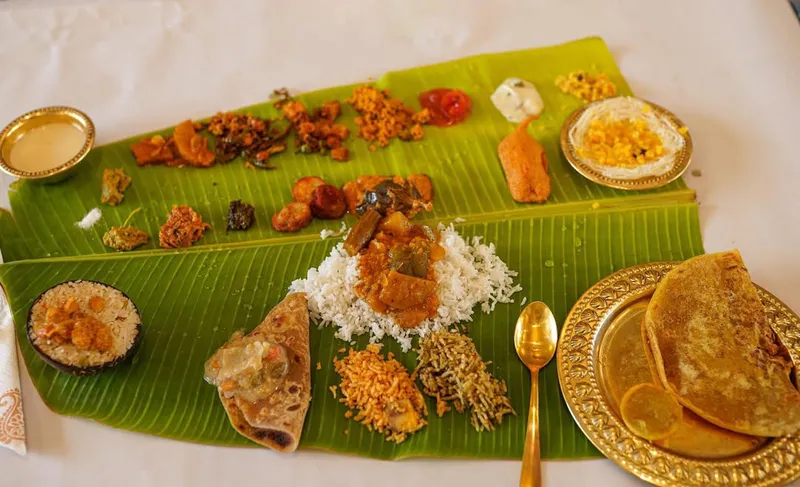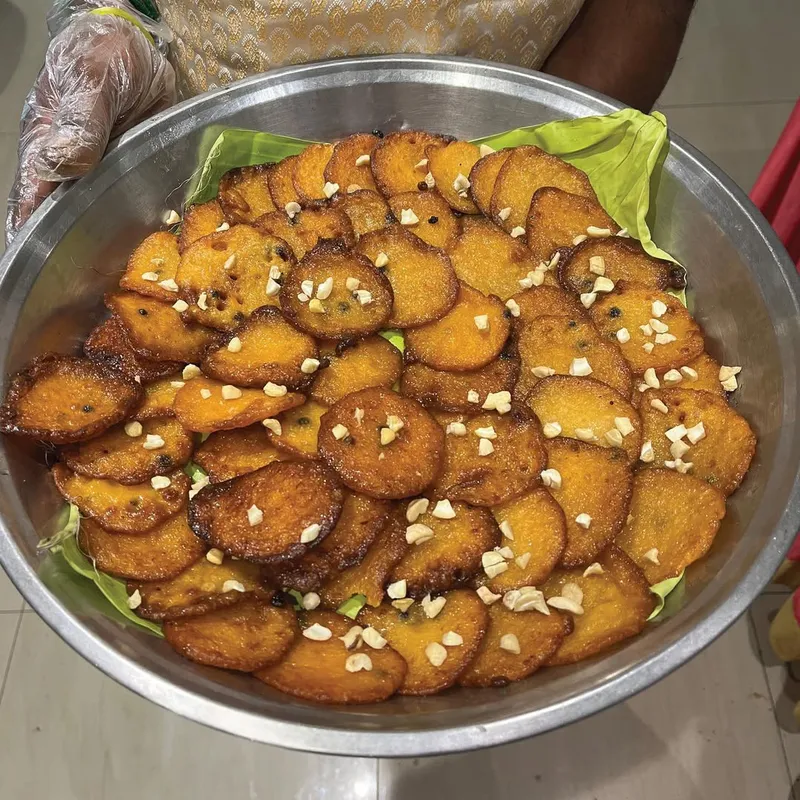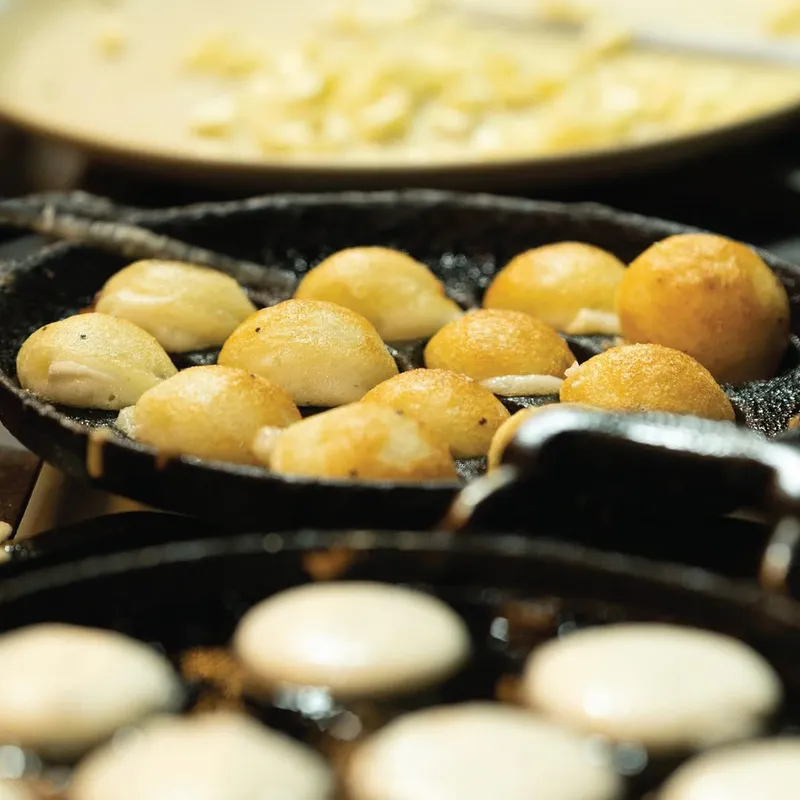From Rajinikanth to Ambani, why everyone wants a taste of Arusuvai
Chennai-based legacy brand Arusuvai Arasu has carved a niche for itself in the food catering business, primarily serving scrumptious South Indian fare.
Swift notes from maestro Shashank Subramanyam’s flute whip through the air, which is as nippy as it can get in Chennai in December. Ardent rasikas nod their heads, the diligent ones take notes, while a few restless folks twiddle with their phones.
What completes the picture is all the action next door—at a makeshift canteen, which is busy dishing out crispy bajjis and podi dosais.
The famed ‘December music season’ has well and truly arrived in the city.
Predominantly held during the Tamil month of Margazhi, the music season features hundreds of Carnatic music kutcheris (concerts) across the city in various venues—organised by sabhas or music-centric organisations. It’s not just the music that attracts people to these venues; food also plays an integral part of the whole Margazhi experience.
The venue for the flute concert is a wedding hall transformed into a performance arena. After a brisk recital, Shashank gathers his friends and family around a table in the canteen for a quick bite.
Perhaps he was drawn by the brand name of ‘Arusuvai Arasu’, which is catering the food at the venue.
Arusuvai Arasu Caterers, a reputed name in the catering space in Chennai, has been in the business for more than 70 years, primarily serving scrumptious South Indian fare at weddings and other events.
During Margazhi, which is the off-season for weddings, Arusuvai caters to the taste buds of music lovers.
“Through the sabha canteen, my grandfather (the late Nataraja Iyer) wanted to provide food for those who came to the concerts,” says Kamesh Narayanan, Managing Director, Arusuvai Arasu.
Soon the canteen became popular for the “overwhelming variety” of items it served, he adds.
The company’s New Year’s lunch for Sri Parthasarathy Swami Sabha is a sought-after spread during the music season, with an astounding array of 40-45 items served on a gold-coated plate.
“My grandfather’s idea was to give wedding fare during the music festival. It’s not just about the variety served; it’s also about the service, taking care of people … All this changed the dynamics of the Margazhi season,” explains the third-generation entrepreneur, who’s proudly carrying on the legacy of Arusuvai.

Tradition served on a leaf: Arusuvai Arasu Caterers has been in the catering business for more than 70 years, primarily serving scrumptious South Indian fare at weddings and other events. Image credit: Arusuvai Arasu
Evolution of the brand
The Tamil word ‘arusuvai arasu’ translates to ‘king of six tastes’. Living up to this name is no small feat, but the brand’s journey exemplifies its effort to do so.
With a clientele that boasts big names such as Pandit Jawaharlal Nehru back in the days, the Rajinikanth household, actor Dhanush, and the Ambani family, Arusuvai has carved a niche for itself in the catering business. From simple functions and corporate events to grand celebrations and destination weddings, Arusuvai does it all.

Kamesh Narayanan, Managing Director, Arusuvai Arasu Caterers
Nataraja Iyer, who is originally from Kumbakonam in Tamil Nadu, came to Chennai in the early fifties looking for work. He worked at a restaurant in the city as the chief cook. Soon word spread about the magical quality of his food and service, and Iyer began bagging small catering orders.
The name ‘Arusuvai Arasu’ was given by former President of India, VV Giri, whose daughter’s wedding catering was handled by Iyer.
While offering the six tastes of ‘sweet’, ‘sour’, ‘bitter’, ‘salty’, ‘astringent’, and ‘pungent’ through its food, Arusuvai has also had its fair taste of highs and lows.
Over the years, the company has risen from strength to strength—from a team of four to 250-300 employees on a permanent roll and around 2,000 people on contract. Apart from events across India, it has also catered to South Indian weddings in Australia, France, Dubai, and Bali.
As its operations grew, so did its business model—evolving from a labour-intensive work in the early days, followed by a contract business, to what it is today.
“Today we have the price-per-plate concept and full-event contracts, where we take care of everything from food to the presentation and service. It is much more process-oriented now with a focus on uniformity and grooming,” says Narayanan, who joined the family business in 2016, straight out of business school.
Food is a people-centric business
While food is at the heart of its operations, Arusuvai is equally committed to service. Narayanan believes keeping people happy and satisfied is what makes the brand stand out in a crowded market. It may cater to 200-250 events in a year, but that doesn’t deter Arusuvai from offering personalised attention to every attendee.
“Whether it’s a celebrity wedding or a small event, we need to give the same attention to everyone; people expect that of us, that’s why they come to us.”
“We accept only three to four weddings in a muhurtam (an auspicious time), so that some family member is present at the event,” says the entrepreneur, who ensures that either he, his wife, aunt, or father is at every event, attending to the minutest detail and making people feel at home.
This is a trait he has learnt from his grandfather who always considered every event as one in his own family.
From masala chai to bitter gourd: This bar offers cocktails ‘ASPER’ seasons
Lessons and learnings
Narayanan’s lessons began from childhood, as he spent his free time learning the tricks of the trade at the various events hosted by Arusuvai.
He learnt everything from scratch—how to hold the ladle and the bucket containing sambar or rasam, how to serve on the banana leaf, and the order in which the foods have to be served.
“I learnt all the techniques that go into the art of serving,” Narayanan recalls fondly. “Then I came into the kitchen and observed what was happening there. Every day was a lesson.”
Crisis management is another key lesson that he has picked up from observation and experience.
Five years after joining the family business, he handled his first event in Coimbatore. The expected turnout was 3,000, but the crowd swelled to 5,000, leaving him in more than a spot of bother.
Fortunately, his team supported him well, and he was able to rise to the occasion and ensure no one went without food. “This was my first event, and I saw firsthand how intense things could get,” he recollects.
Narayanan received another big lesson in handling a crisis when the recent rains in Chennai threatened to wreak havoc on an outdoor event.
Innovations and experiments
Arusuvai may be operating in a traditional space, but it has never shied away from innovations.
For instance, it gave an unexpected twist to the traditional paruppu usili—a dish made with lentils, spices, and beans/cluster beans—by substituting the beans with asparagus and zucchini.
Lemon grass rice is yet another interesting take on the traditional lemon saadham (rice).

Arusuvai Arasu has expanded beyond South Indian food to Punjabi, Maharashtrian, and Rajasthani dishes; Bengali sweets; Italian and Mexican cuisine, Asian fare, and more. What you see in the picture are mouth-watering malpuas.
Image: Arusuvai Arasu
The innovations are tried and tested in small groups before they are presented in a wedding to a large crowd.
While some experiments have been received well, some have misfired too—in which case the team doesn’t hesitate to drop the idea and move on. For instance, it tried out pav bhaji with Thai green curry, but people didn’t warm up to it.
“Our R&D team in the kitchen experiments with an open mind. But if people don’t accept it, we don’t recommend that dish ... We also don’t compromise on the authenticity of the cuisine—in taste or the basic method of preparation,” Narayanan says.
Arusuvai is renowned for its flavourful sambar and rasam and traditional South Indian sweets, like Kasi halwa, Ashoka halwa, badusha, and Mysore pak.
That said, over the years, it has ambitiously expanded its repertoire to Punjabi, Maharashtrian, and Rajasthani dishes; Bengali sweets; Italian and Mexican cuisine, and Asian fare.
“My uncle and father have innovated many new foods and ideas. My uncle brought in North Indian sweets and multi-cultural cuisine into the South Indian wedding, which was till then offering only typical South Indian food,” elaborates Narayanan.
Arusuvai has also been dabbling with different ways of presenting food. At a recent wedding, it presented items made from banana—chips, roast, and vada—inside a banana leaf shaped like a boat. In another event, it came up with a ‘live menu’—featuring edible miniatures of all the foods to be served for breakfast.
The company is currently working on a restaurant-style setup, replete with tables, chairs, menu cards, and service staff.
Trends and technology
Narayanan believes the catering sector has become more professional after the pandemic and credits the emergence of new players, especially young, educated people, for the recognition it has received of late.
According to him, weddings today have become a showcase of one’s growth and lifestyle. In big fat Indian weddings, people are willing to spend a lot on food—some are ready to cough up even Rs 15,000 per plate, remarks Narayanan.
And what’s on the plate? A whole lot of South Indian food.

Despite operating in a traditional space, Arusuvai has never shied away from innovations. Some of its innovations include asparagus paruppu usili, lemon grass rice, cheese paniyram (in pic), and litchi payasam. Image: Arusuvai Arasu
Awareness about South Indian food has increased in recent times with ela saapadu (meals served on plantain leaf) featuring even in North Indian weddings, says Arusuvai’s MD.
In the age of technology with AI finding its way into many kitchens, Arusuvai has managed to retain its roots. Everything is hand-cooked on site, and Narayanan vows that it will continue to remain so.
Processes are where the company has adopted technology to make it a lean professional entity—with practices such as bulk procurement and cold storage.
No compromise on core
Having led Arusuvai for about nine years, Narayanan has a clear vision for the future of the business. He believes there is a lot more to achieve in the catering business and wishes to elevate it to an ‘industry’ status.
First up on the cards is expansion to Coimbatore and Bengaluru, with local teams stationed in both these cities.
While Arusuvai does not have plans to diversify into the restaurant or ready-to-eat foods business as of now, “small innovations” and “twists” will continue, promises Narayanan.
“However, we will stick to our core and not compromise on our working style. Tradition has to be followed. We are keen on this.”
(Feature image: Nihar Apte)
Edited by Megha Reddy







